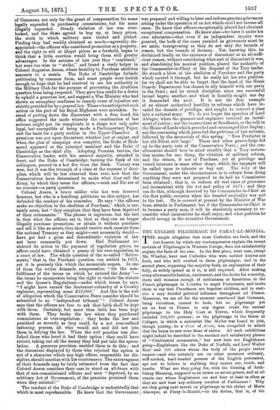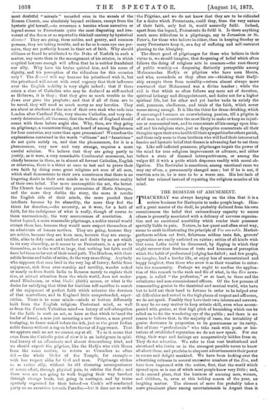THE ENGLISH PILGRIMAGE TO PARA Y-LE-MONIAL.
THE simple allegation that most Catholics are fools, and the rest knaves, by which our contemporaries explain the recent revivals of Pilgrimages in Western Europe, does not satisfactorily explain the facts of the case. In the first place, most men, except Mr. Whalley, have met Catholics who were neither knaves nor fools, and who still exulted in these pilgrimages; and in the second place, supposing the majority fools, an explanation of their folly, so widely spread as it is, is still required. After making every allowanceforfashion, excitement, and the desire for a novelty, there still remains enough of enthusiasm or fanaticism in the French pilgrimages to Lourdes to anger Protestants, and incite them to say that Frenchmen are hopeless children, and to exer- cise a very decided political influence throughout all France. Moreover, we are all for the moment convinced that Germans, being victorious, cannot be fools, but no pilgrimage yet set on foot in France in any degree rivals the annual pilgrimage to the Holy Coat at Treves, which frequently included 100,000 persons ; or the pilgrimage to the bones at Cologne, in which a naturalist like Muller was found to join, though joining, he a devot of devots, was compelled to admit that the bones he saw were those of calves. All such exhibitions might indeed be described in the succinct and satisfactory phrase of "Continental mummeries," but now here are Englishmen going—Englishmen like the Duke of Norfolk, and Lord Walter Kerr and 500 others whom the body of the people rather respect—and who certainly are on other occasions ordinary, stiff-necked, hard-headed persons of the English persuasion, apt not to believe in anything they cannot see, touch, and handle. What are they goiug for, with the blessing of Arch- bishop Manning, supposed to be rather an astute person, and at all events, one whom Englishmen see and hear at least as often as they see and hear any ordinary member of Parliament ? Why are they going next month on pilgrimage to the shrine of Marie Alacoque, at Paray-le-Monial,—to the shrine, that is, of the most doubtful " miracle " recorded even in the annals of the Roman Church, one absolutely beyond evidence, except from the hysteric girl herself,—to reverence a heroine whose narrative or legend seems to Protestants quite the most disgusting and irre- verent of the dozen or so reported in this half-century by hysterical devotes? They are going, these nobles, and gentry, and common persons, they are taking trouble, and so far as human eye can per- ceive, they are perfectly honest in their act of faith. Why should silliness or fraud be attributed to the Duke of Norfolk in such a matter, any more than in the management of his estates, in which sceptical lawyers enough will affirm that he is neither fraudulent nor silly. Why have his brains quitted him, and his sense of dignity, and his perception of the ridiculous for this occasion only ? The Record will say because his priesthood wish it, but -the priesthood will retort with cruel cogency that their influence over the English nobility is very slight indeed ; that if there exists a class of Catholics who may be declared as stiff-necked as Hebrews, it is they ; that they give as much trouble as the Jews ever gave the prophets ; and that if all of them are to be saved, they will need as much mercy as any heretics. They are about as obedient as the men of their own rank who rode into London after Cardinal Pole, very sincere Catholics, and very sin- cerely determined, all the same, that the welfare of England should count with them before aught else. Why, then, are they going on pilgrimage, a monstrous thing, not heard of among Englishmen for four centuries, any more than open processions? We confess the explanations contained in the words "silliness" and "fanaticism" do not quite satisfy us, and that the phenomenon, for it is a phenomenon, very new and very strange, requires a more careful solution. We believe that they are going partly to justify, as it were, a very remarkable Continental movement, but chiefly because in them, as in almost all fervent Catholics, English or otherwise, there is a thirst at once to teat and to prove their own faith by doing some great religious act seen of all men, which shall demonstrate to their own consciences that there is no lingering doubt in their own minds as to the substantive reality of their own belief. The more contemptible the act, the better. The Church has sanctioned the pretensions of Marie Alacoque, and the more they dislike the story, the more it revolts the English side of their minds, the more puzzled their intellects become by its absurdity, the more they feel the thirst for devotion,—the necessity, as it were, for a bath of faith, for the indulgence of what is really, though of course to them unconsciously, the very sensuousness of conviction. A better legend, a more reasonable pilgrimage, a nobler travail would attract them less, because they would more suspect themselves of an admixture of human motives. They are going, because they I are nobles, because they are keen men, because they are suscep- tible, alike to defy caste and intellect and doubt by an act which I in its very absurdity, as it seems to us Protestants, is a proof to themselves, as to the world at large, that nothing but faith could have led them so far out of their usual path. The Hindoos, with their subtle brains and habit of satire, do the very same thing. Anybody who supposes that men bred in the very lap of luxury, feeble from enjoyment, sick from over-worship and servility, wander naked or nearly so from South India to Benares merely to expiate their sins, or attract attention from the whole world, does not under- stand Hindooism, or what bhakti (faith) means, or what is the desire for satisfying that thirst for limitless self-sacrifice in search of the enjoyment of perfect faith which actuates the devotees of that marvellous, and in England little comprehended, super- stition. There is to some minds—minds at bottom differently built from the English religious Protestant mind, as well as from the French Voltairian mind—a luxury of self-abnegation for the faith in such an act, as keen as that which incluced the leader of Israel, a man just mounting a new throne, a man proud to slaying, to dance naked before the Ark, just as the great Indian noble dances without a rag on before the car of Juggernaut. That we approve such an act we cannot say at all. To us it seems that even from the Catholic point of view it is an indulgence in spiri- tual luxury of an effeminate and almost demoralising kind, and we should expect the pilgrims, like the Hadjis who visit Mecca from the same motive, to return as Crusaders so often did — the whole Order of the Temple, for example— with leas respect alike for God and man. Pilgrimage strikes us as rather silly, without its old cleansing accompaniment of severe effort, through physical pain, to subdue the flesh ; and these men are not going to walk begging their way barefoot through strange lauds, but going in carriages, and by trains , specially organised for their behoof —a Cook's self-conducted party on an excursion towards Paradise—but it does not so strike
the Pilgrims, and we do not know that they are to be ridiculed for a desire which Protestants, could they, from the very nature of their faith, only feel it, would assuredly fulfil. Indeed, apart from the legend, Protestants do fulfil it. Is there anything much more ridiculous in a pilgrimage, say to Jerusalem or St. Peter's, for those who believe in either, than in keeping Sunday as many Protestants keep it, as a day of suffering and self-restraint pleasing to the Almighty.
The direct good of pilgrimages for those who believe in their virtue is, we should imagine, that deepening of belief which often follows the doing of religious acts in common—the root-theory of public worship —a deepening distinctly perceptible among Mohammedan Hadjis or pilgrims who have seen Mecca, and who, scoundrels as they often are—thinking their Hadji- ship exempts them from morality—return almost always more convinced that Mohammed was a divine teacher ; while the evil is that which so often follows any mere act of devotion, spiritual lethargy and disappointment, and desire not for a higher spiritual life, but for other and yet harder tasks to satisfy the soul, penances, obediences, and trials of the faith, which never seems strong enough. It is like the thirst for dram-drinking, which if encouraged becomes an overwhelming passion, till a pilgrim is of all men in all countries the most likely to make or keep an injuri- ous or nonsensical vow, and to concentrate all his energy upon him- self and his religious state, just as dyspeptics concentrate all their thoughts upon their own health till their sympathies for others perish, and those only seem to them brethren who will feed their introverted fancies and hysteric belief that disease is advancing fast to eat them up. Like self-inflicted penances, pilgrimages impair the power of the mind for true religious improvement or advance, and either induce a state of diseased introspectiveness, or among the vulgar fill it with a pride which dispenses readily with moral ob- ligation. The Revivalist is sometimes, among emotional races we may say often, a permanently changed man ; but if he is not, if reaction sets in, he is sure to be a worse one. His hot-bath of belief has relaxed instead of repairing the religious muscles of his mind.































 Previous page
Previous page